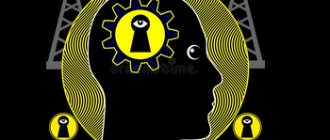It is not news that there is a strong and consistent connection between alcohol addiction and various mental disorders. In this article we will try to figure out what the relationship is between schizophrenia and alcoholism, or whether these two essentially diseases can develop separately without correlation with each other. Of course, the main cause of any psychopathy is a hereditary factor, so a schizophrenic, in principle, may not be an alcoholic, but in any case, addiction aggravates the symptoms of any mental disorder. In the scientific community, the correlation of these conditions is regulated by the principle of comorbidity.
This principle defines the connection between alcoholism and schizophrenia in two directions:
The first of which is the development of a schizophrenic disorder against the background of alcohol abuse, and the second is the schizophrenic’s falling into binge drinking due to the fact that the disease itself increases the craving for alcohol.
Let's figure out why this happens, what symptoms should alert you, and whether there is an effective treatment.
Forms of alcoholic schizophrenia
Against the background of addiction, schizophrenic disorder is defined by two types:
- Paranoid form
. The symptoms of this type of pathology themselves are quite vague. But among the symptoms it is worth noting hallucinosis and delusion. - Schizotypal form
. Also defined as a low-grade mental disorder. The patient is characterized by strong tension, including somatic tension, and a certain amount of aggression in behavior. During periods of heavy drinking, the symptoms described above worsen.
Classification of the disorder according to the nature of its course
- Unfavorable form
. Personality degradation occurs rapidly in a short period of time. - Continuous
. Paroxysmal states alternate with calm periods and remission. - Paroxysmal
. It happens once, and according to statistics, it does not happen again. - Progressive paroxysmal
. Acute conditions occur regularly and progress each time.
What is alcoholic schizophrenia
Schizophrenia is characterized as dementia praecox. There is a split in thinking and changes in the emotional sphere. But mental illness can be true (primary) or secondary. That is, true schizophrenia has nothing to do with alcoholism.
A mental illness arising from alcoholism is a secondary pathology. In other words, this is a complication that arose against the background of chronic intoxication.
In this case, the disease does not develop according to the standard scenario. Symptoms increase slowly and gradually. The first signs that indicate a schizotypal disorder appear after a long time (from 8 to 10 years).
In cases where alcoholism precedes the first manifestations of an endogenous disease, a rather late manifestation of mental illness and a slow increase in productive symptoms are noted. First, subdepressive disorders arise, then polymorphic psychopathic-like and negative symptoms develop.
Comorbid disorders in patients with alcohol dependence. O. Zh. Buzik, T. V. Agibalova.
Alcohol and schizophrenia
The influence of alcohol on the course of schizophrenia
In the scientific community, the term "alcoholic schizophrenia" is used informally. According to the ICD-10 classification, such a diagnosis does not exist in principle, and all because the psychopathic destruction that accompanies alcohol addiction is more likely characteristic of alcoholic delirium and, in fact, has no relation to such a disease as schizophrenia. Nevertheless, it has been proven that an exacerbation or sudden development of a schizophrenic disorder can be triggered by alcohol abuse. although under the influence of alcoholism the development of schizophrenic disorders can occur.
Symptoms and signs of schizophrenia due to alcoholism
Alcoholic schizophrenia is characterized by the following early signs: hypochondriacal neurosis, namely anxiety, depression or depression, fears of various origins, as well as aggressive behavior. At the physiological level, sudden changes in body temperature and headaches can be observed. Then hallucinations may begin.
In psychiatry there is such a concept: “the face of a schizophrenic,” and this is one of the first symptoms of alcoholic schizophrenia, among other things. This refers to the distant, lost, mask-like face of the patient; teary, shiny eyes expressing an indifferent look. Next, the patient may begin to experience problems such as sleep disorders, as well as nightmares that are repeated, general apathy, causeless anxiety, irritability, which have already been mentioned above.
Further, the symptoms depend on the amount and regularity of alcohol consumed.
In case of moderate but prolonged drinking of alcohol on a regular basis, a state of delirium may develop. The patient is tormented by the torment of persecution or, on the contrary, suddenly begins to realize his superiority over others and imaginary exclusivity.
A long-term binge leads to the appearance of hallucinations of various types (mainly auditory), in which he hears threats and accusations against him.
If the patient suddenly suddenly stops drinking after a long binge, then there is a chance of getting delirium tremens or delirium tremens. In this case, the hallucinations are much more terrible and painful than in the previous one.
All the signs described above are very dangerous, not only for the “alcoschizophrenic” himself, but also for those around him, so they require mandatory treatment and supervision by a specialist.
Symptoms of schizophrenia aggravated by alcoholism
The pathogenesis of the relationship between alcoholism and schizophrenia has been clinically well studied. And the most important difference between an alcoholic schizophrenic is that the main symptoms are most clearly observed in a sober state, in contrast to ordinary alcoholism, when symptoms appear while drinking alcohol
Also in this aspect, one can note such signs as disorders of the nervous system, neurosis and psychopathic states, muscle tension, panic attacks. In any case, you need to remember that both described disorders in interconnection aggravate each other, sometimes forming a deadly combination.
The influence of alcohol on the course of schizophrenia
As noted above, alcohol addiction can lead to various types of psychopathy and psychopathic disorders. Schizophrenia is no exception, but it is important to remember that if the hereditary gene responsible for the predisposition to this disease is absent, then an alcoholic will not become a schizophrenic. It’s another matter if he has a history of this genetic predisposition, in which case alcoholism can accelerate or provoke the development of a schizophrenic disorder.
Thus, to the question: “Can schizophrenia occur against the background of alcoholism”? The answer is negative. Alcoholism can provoke it, accelerate its development, aggravate symptoms against the background of existing factors, but it does not serve as a trigger mechanism for its appearance.
Why do people with schizophrenia drink alcohol?
According to statistics, most schizophrenics abuse alcohol. This is due to the fact that against the background of illness, they tend to immerse themselves in themselves. And alcohol just contributes to this immersion, removing the accompanying irritating factors. It seems to the patient that he is relieving tension in this way, receiving an illusory feeling of calm, but in fact, irreversible changes in the structures of the brain occur in his body, which could develop much more slowly if there was no addiction to alcohol. A dose of alcohol partially eliminates symptoms such as anxiety and fear attacks, but affects the development of hallucinosis and delusional states. While intoxicated, a schizophrenic becomes very impulsive, agitated and sometimes aggressive.
Other affective disorders inherent in schizophrenia also begin to develop rapidly. Quite quickly, the patient faces amnesia, speech problems, disadaptation and desocialization.
And the last sad fact is that treatment of schizophrenic disorder against the background of alcoholism is difficult, and sometimes impossible. The initial task that the specialist faces in this anamnesis is to bring the patient out of the binge and neutralize the intoxication of the body.
Alcohol schizophrenia
It has been proven that schizophrenia due to alcoholism can develop in people with schizoid character traits. Gender and age in this case do not matter. A genetic predisposition to this mental illness is found among heavy drinkers whose parents were schizophrenics (70% - father and mother, 10% - one of them).
However, alcoholic schizophrenia is most likely not about this, although in some sources this is what they mean by a combination of schizophrenia and alcoholism. Actually, this is not a disease, but a generally accepted term. This is the name for severe psychosis, which was provoked by alcohol abuse. It occurs when the access of alcohol to a body poisoned by alkaloids is abruptly stopped after long-term and excessive consumption.
In medical circles, this condition is diagnosed as Delirium tremens - shaking stupor, alcoholic delirium, and among the people - delirium tremens or “squirrel”. Such metal-alcohol psychosis occurs in the second or third stage of alcoholism, on the second to fifth day after the drinker suddenly stops drinking.
Where did the term “alcoholic schizophrenia” come from? Yes, all because the clinical picture of this alcohol dependence syndrome very much resembles a serious mental disorder - schizophrenia with such signs:
- speech and motor stimulation;
- sleep disturbance, nightmares;
- hallucinations;
- violation of orientation in time and space.
In a state of delirium tremens, an individual experiences visual and tactile hallucinations, quite vivid, caused by damage to the brain by toxins. The alcoholic hears voices, talks with them, sees shadows and silhouettes. It seems to the patient that insects, snakes, mice, etc. are crawling over him, he feels their touch, someone puts a gag in his mouth, ties his wrists. All this happens clearly that the person considers it a danger to himself and tries to get rid of it: he brushes the annoying creatures off his body, wraps a mythical rope around his hand, pulls out a non-existent gag.
This situation, which continues for a long time, can become a threat to others, because the alcoholic listens to the voices in his head and does what they “whisper” to him. And these can be quite terrible instructions: to do something to yourself or to others, even suicide and murder.
In addition, severe psychosis manifests itself with chills, fever, deep depression, aggressiveness, irritability, and delirium.
If signs of alcoholic schizophrenia appear, you should immediately contact a specialist, since delay can result in harm, suicide or crime, that is, it will be very costly for both the patient and those around him.
Schizophrenia and drugs
As we noted above, alcohol itself cannot provoke schizophrenia if a person is not initially predisposed to it. It's the same with drugs and other types of chemical addictions. It is a myth that drugs can cause schizophrenia, but they can provoke its rapid development due to a number of factors and aggravate the course. Moreover, the most dangerous in this case are drugs of the neurostimulating spectrum, LSD, ecstasy and marijuana. By the way, many people incorrectly believe that light smoking herbs stabilize the nervous system, but this is also a myth! Smoking marijuana or other substances aggravates a psychotic episode. In general, schizophrenia and alcoholism or drug addiction are incompatible and extremely dangerous things, mainly due to the fact that against the background of their influence the risk of suicide on the part of the patient increases.
Schizophrenia and smoking
Smoking is one of the most common types of addictions. Millions of people around the world smoke tobacco and do not suffer from schizophrenia. However, scientists have proven that the number of schizophrenics among smokers is twice as high as among non-smokers. From a physiological point of view, this can be explained by: That smoking primarily affects the activity of the cardiovascular and pulmonary systems. Changes in blood pressure, less oxygen supply to the body, and blockage of blood vessels in the brain also lead to irreversible and sad changes, including the provocation of various psychopathic disorders, one of which is schizophrenia.
Peculiarities of drinking alcohol in patients with schizophrenia
The main feature of drinking alcohol by schizophrenics or people suffering from other mental disorders is that, in principle, they never need company. By and large, a classic alcoholic does not need it either, but unlike a mental patient, an alcoholic does not have long conversations with himself. A schizophrenic does not just talk alone, but is capable of discussing highly intellectual topics. Against the background of a schizophrenic disorder, a person is less prone to binge drinking, however, they are not excluded. Most often, after drinking alcohol, the patient’s condition worsens, neuroses worsen, anxiety increases, and amnesia may occur. It is also worth noting that in a state of intoxication, the onset of schizophrenic disorder becomes more likely.
Treatment of alcoholic schizophrenia
The treatment algorithm for a schizophrenic suffering from alcohol abuse is a multi-level approach consisting of the following stages.
Any drug treatment can be prescribed only after the body has been completely cleansed of alcohol-containing substances. That is why the first step is detoxification. Only after complete neutralization of the elements of ethanol breakdown can appropriate treatment be prescribed to the patient. As for the complex of stabilization drugs, psychotropic medications and tranquilizers are most often prescribed. Among the main ones are: neuleptil, sibazon, thorazine and oxazepam. To restore nerve tissue, nootropic drugs and vitamin complexes for various purposes are usually used.
As in the case of any other mental illness or alcoholism itself, psychotherapeutic support and normalization of lifestyle are recommended. Psychotherapy, by the way, is one of the fundamental stages of treatment and rehabilitation. As for lifestyle, the patient should spend more time in the fresh air, practice sports or other physical activities in accordance with the general state of health, communicate more with family and, of course, stop drinking alcohol or other harmful substances.
Also one of the frequently used methods is coding. Unlike an ordinary alcoholic, it is not difficult to convince a schizophrenic of the need for this procedure, but in the case of a mental disorder, the risk of a “breakdown” increases many times, which also leads to not the most pleasant consequences.
A general and mandatory recommendation is the need to hospitalize the patient in an appropriate medical institution and carry out the set of measures described above under the supervision of a specialist. A chronic alcoholic with a psychopathic complication should under no circumstances self-medicate at home. So the main advice is to use a professional approach to therapy, since self-treatment can be extremely dangerous.
How to recognize a patient with schizophrenia?
09.12.2019
Schizophrenia is a mental illness characterized by impaired brain activity and changes in the patient’s emotional reactions. Its first signs usually appear in adolescence. A person suffering from this disease may not be aware of it for some time, just like his loved ones. Manifestations of the disease can begin unexpectedly after some kind of emotional shock or during the abuse of illegal drugs.
Main signs of schizophrenia
The following changes begin to occur in the patient’s personality and character:
- inadequate reaction to what is happening;
- various crazy ideas;
- changes in character traits and habits;
- isolation from society;
- delusional ideas;
- hallucinations.
This is no longer the same person who was previously known to his loved ones. His emotional reactions become inadequate and inappropriate to what is happening. He may show unreasonable jealousy towards his spouse, and also express various delusional ideas, for example, about persecution. From a sociable and cheerful person, the patient turns into a gloomy and untalkative one, stops being interested in what was interesting to him before, completely stops communicating with friends and, without explanation, stops going to work and school. The patient's movements and actions become chaotic and devoid of logic. He can walk around the room in circles for a long time or, conversely, sit silently for hours, staring at one point. Typically, people with schizophrenia begin to experience visual and auditory hallucinations during which they may receive orders. Thus, the patient can become dangerous to himself and other people.
Causes of schizophrenia
This disease can occur for a number of reasons. Most often this is a genetic predisposition, but there are other factors:
- maternal complications during pregnancy ;
- birth injury;
- severe psychological trauma suffered in childhood;
- alcohol or drug abuse;
- disturbances in the structure of the brain .
There are versions that residents of large cities suffer from this disease more often than residents of rural areas. For unknown reasons, schizophrenia is found less often in men than in women. With this disease, physiological changes occur, namely, the size of the ventricles of the brain , which can be checked using magnetic resonance imaging. There is a connection between the manifestation of the disease and the attitude towards the child in childhood. If a child has been rejected as an individual, not loved, or has been subjected to physical or emotional abuse by adults, this may cause schizophrenia in the future.
Treatment of schizophrenia
This disease is not completely curable. But with the right approach and in favorable conditions, it is possible to achieve stable remission in the patient. First of all, if any signs similar to those of schizophrenia appear, a person should consult a doctor . Strange behavior that was previously unusual for a person may be a sign of either schizophrenia or some other mental illness. Depending on the severity of the disease, the person may be hospitalized for a time. This is likely if his condition is at an acute stage, and the patient poses a danger to others. As a rule, drug treatment is prescribed. of psychotherapy can be connected to it . Treatment can last for years before the patient enters a state of stable remission. During treatment, the lifestyle a person leads plays an important role. It is necessary to give up bad habits; playing sports, for example, swimming, frequent walks in the fresh air, and having some interesting hobby will be useful. The support and correct behavior of the patient’s close relatives and their patience also play an important role. You should communicate with the patient calmly and confidently, carefully observing his behavior. It is important not to miss attacks of aggression on his part, if they occur.
Even such a serious disease can be practically overcome by learning to live with it. You just need to take a responsible approach to all doctors' .
Published in Psychiatric Help Premium Clinic









